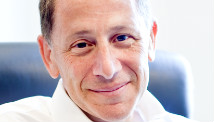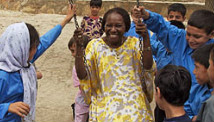STORY HIGHLIGHTS
- Dorner is now accused of killing four people
- Wardens spot him driving a purple Nissan down icy roads
- He carjacks a pickup truck and barricades himself in a cabin
- A shootout ensues
Follow the story here and at CNN affiliates KCBS/KCAL, KABC, and KTLA.
Near Big Bear Lake, California (CNN) -- It may take days before authorities can officially determine whether Christopher Jordan Dorner's body was found in the ashes of a torched cabin near Big Bear Lake, California.
But several signs early Wednesday seemed to suggest that the ex-Los Angeles police officer's vendetta against his brothers in blue ended in that wooden cabin with a shootout that left one deputy dead and another wounded.
The frenzied manhunt, road blocks and helicopter flights, which had brought the mountain town to a standstill for six days, died down Tuesday night.
And late in the evening, authorities announced that they found human remains in the cabin and would need forensic experts to identify them.
But even as the question of Dorner's fate seemed close to being answered, other details eluded explanation.
The carjacking
The deputy's death in the shootout Tuesday brought to four the number of people Dorner is accused of killing.
Dorner, a man who vowed to kill police officers to avenge what he called an unfair termination, was first named a suspect in two shooting deaths on February 3: that of the daughter of his police union representative and of her fiance.
Police also say he killed one officer in Riverside, California, and wounded two others Thursday.
Authorities offered a $1 million dollar reward in the case after Dorner's burned truck was found on a forestry road near Big Bear Lake on February 7, about 100 miles east of Los Angeles.
Officers converged on the remote area but the trail went cold for days. On Sunday, the San Bernadino authorities said they had scaled back the search.
Timeline in manhunt
That all changed Tuesday, where arguably the most wanted man in America was finally spotted.
The question of where Dorner was between February 7 and Tuesday was unclear.
Wardens of the California Fish and Wildlife said they spotted Dorner driving a purple Nissan down the icy roads Tuesday. Dorner was driving very close to some school buses as if using them as cover, said Lt. Patrick Foy.
The wardens, driving in two different vehicles, chased Dorner and a gun battle ensued.
A warden's car was hit.
Dorner crashed his car, ran and then quickly carjacked a pick up truck.
Rick Heltebrake, a camp ranger, said he was driving in the area when he saw the crashed purple car -- and then something terrifying.
"Here comes this guy with a big gun and I knew who it was right away," Heltebrake told CNN affiliate KTLA. "He just came out of the snow at me with his gun at my head. He said, 'I don't want to hurt you. Just get out of the car and start walking.'"
Heltebrake said he was allowed to get his dog out of the truck before he walked away with his hands up.
"Not more than 10 seconds later, I heard a loud round of gunfire," Heltebrake said. "Ten to 20 rounds maybe. I found out later what that was all about."
The fire
Dorner fled to a nearby cabin and got into another shootout with San Bernadino County deputies, killing one and wounding another.
San Bernardino County Sheriff John McMahon told reporters Tuesday the other deputy was in surgery "but he should be fine,"
The cabin caught fire after police tossed smoke devices inside, a law enforcement source told CNN.
The intense fire burned for hours as authorities waited at a distance.
Despite the enormity of the blaze, authorities were hesitant to officially say they had stopped Dorner.
"No body has been pulled out," LAPD Cmdr. Andrew Smith said at a news conference Tuesday night. "No reports of a body being ID'd are true."
Cindy Bachman, a spokeswoman for the lead agency in the case -- the San Bernardino Sheriff's Department -- echoed the words, saying at a separate news conference that authorities believe whoever was in the cabin never left.
"They believe that there is a body in there, but it is not safe to go inside," she told reporters.
Finally, late Tuesday night, sheriff's investigators said they found charred human remains within the ashes of the torched cabin.
The department said it will work to identify the remains -- but it could take a while.
The security
Clues to the targets of the violence were mentioned in Dorner's fiery manifesto that was posted online. Authorities say Dorner began making good on his threats on February 3 when he allegedly killed Monica Quan and Keith Lawrence in an Irvine parking lot, south of Los Angeles.
According to the manifesto, Randal Quan, Monica Quan's father, bungled Dorner's LAPD termination appeal.
Randal Quan represented Dorner during the disciplinary hearing that resulted in his firing. The officer was among dozens named in the manifesto.
On February 7, Dorner allegedly opened fire on two LAPD police officers, wounding one, in the suburban city of Corona.
Roughly 20 minutes later, Dorner allegedly fired on two officers in the nearby city of Riverside, killing Officer Michael Crain and wounding another.
Since then, the LAPD has provided security and surveillance details for more than 50 police officers and their families -- many of whom were named in the manifesto.
Police said Tuesday night they would continue to protect the people Dorner said he would target until it was confirmed that he died in the cabin.
In the manifesto Dorner wrote about death multiple times. Not just the death of his targets but of his own.
"Self Preservation is no longer important to me," the manifesto said at one point. "I do not fear death as I died long ago."
CNN's Miguel Marquez reported from near Big Bear Lake and Lateef Mungin wrote from Atlanta. CNN's Paul Vercammen, Stan Wilson, Casey Wian, Kathleen Johnston, Alan Duke, Matt Smith, Chelsea J. Carter, Michael Martinez and Holly Yan also contributed to this report.















